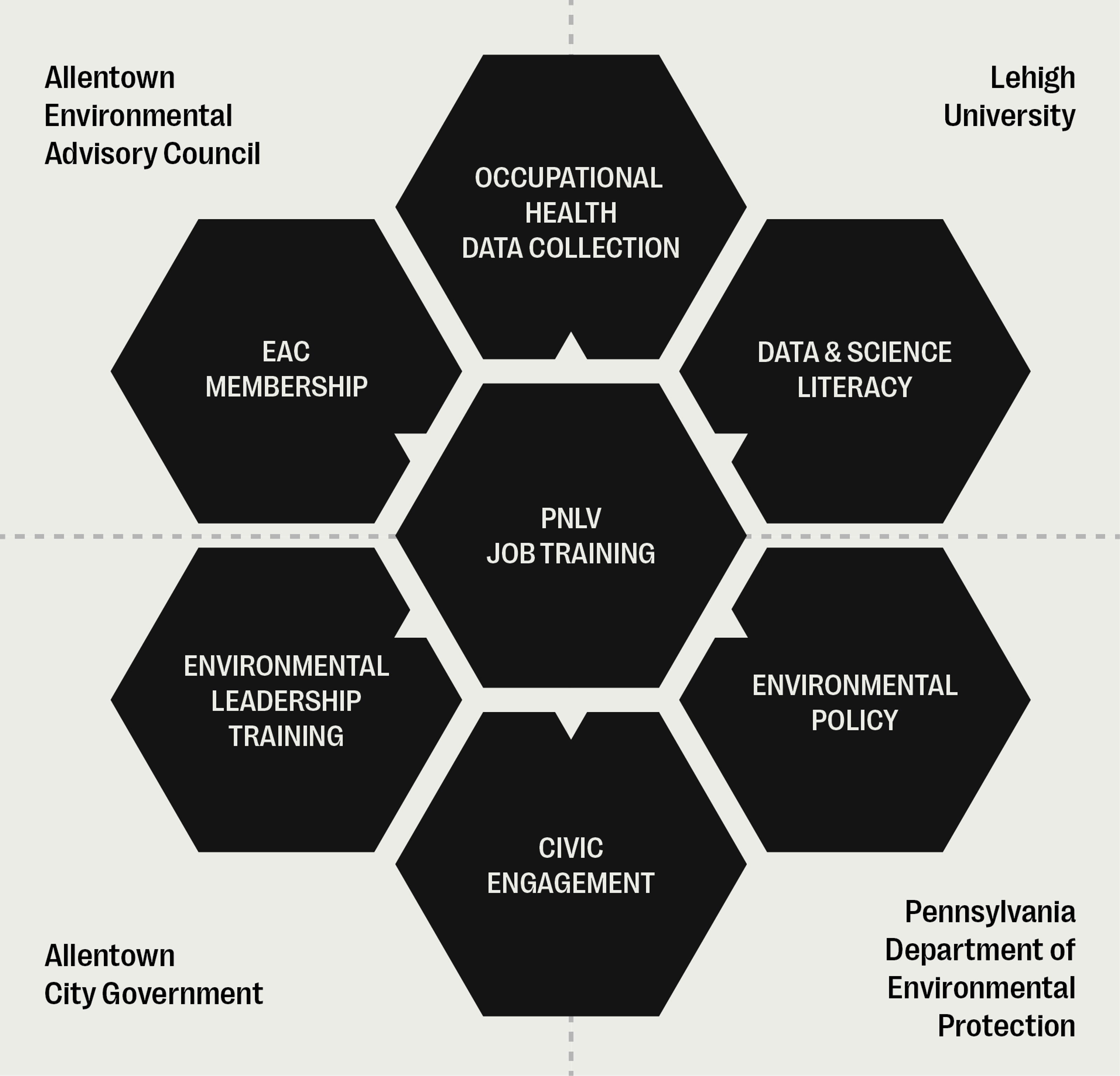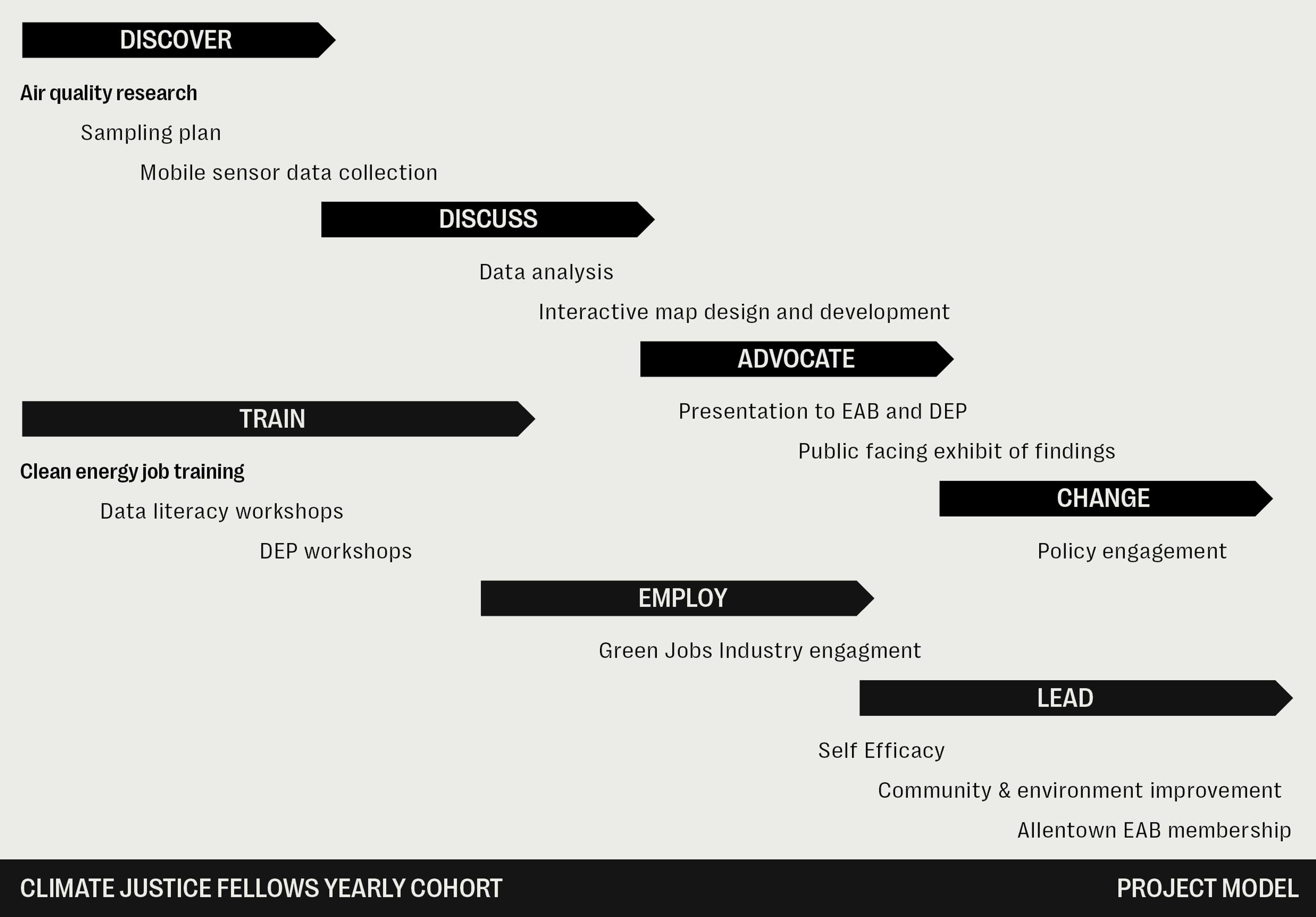Lehigh Valley Promise Equity Fellowship
Empowering Communities for Climate Justice
Our proposed Promise Equity fellowship lays the foundation for the economic stability and advancement of young people in marginalized neighborhoods of Allentown, PA. We also foster their leadership through education in environmental justice awareness, data literacy, engagement, and coalition-building.
Our fellowship program is designed to foster a two-way dialogue between residents, government agencies, and academic institutions using data as the common language.— Hyunok Choi
The City of Allentown, located in eastern Pennsylvania, is the third largest city in the Commonwealth, with a population of 127,804. Allentown represents the “asthma capital” of the US. Allentown houses a medical sterilization company, a growing number of diesel-traffic warehouses, and a local international airport. Allentown is an ‘environmental justice’ community facing many other threats. While White citizens enjoy thriving and growing commerce, disadvantaged citizens (many of whom are people of color) experience jobs, housing, food insecurities, and cultural challenges (e.g., language barrier). The latest US Environmental Protection Agency’s risk assessment deemed Allentown as having the highest excess cancer risks in the US. The Allentown Community Health Needs Assessment conducted in 2023 identified ‘upward economic mobility and health’ as the most urgent issue facing disadvantaged citizens in Allentown. These Allentown communities live adjacent to multiple emission sources such as commercial warehouses, medical sterilization facilities, the Lehigh Valley International Airport, the heavily traveled US 22 highway, and multiple additional environmental justice concerns. Today, Allentown citizens from a lower socio-economic background (50-76 % low income), who are also racial/ethnic minorities (40-60 % people of color) are also disproportionately affected by air pollution.
This project will be conducted based on a partnership between Lehigh University and Promise Neighborhood of Lehigh Valley (PNLV). As a Black-owned social justice organization, PNLV currently serves and mentors approximately 50 youths and adults through job training and professional skill development. During the proposed study’s funding period, PNLV and Lehigh University will collaboratively broaden the scope of PNLV’s existing job training program by introducing clean-energy and weatherization jobs. The target population includes those who had been formerly incarcerated, homeless, have had mental health issues, abused illegal substances, or aged out of the foster care system. Our project aims to create a pathway for 55-60 Promise Equity Fellows to gainful employment by providing essential soft skills and life skills training (teamwork, conflict resolution, finance management, resume-writing, etc.) centered on healing, camaraderie, and hope.

Our proposed Promise Equity Fellowship lays the foundation for the economic stability and advancement of young people. We also foster their leadership through education in environmental justice awareness, engagement, and coalition-building. Our Promise Equity fellows will directly learn from and with Lehigh University, PA DEP, and the City of Allentown through the Environmental Advisory Council. The fellow will also receive training in environmental health, justice, climate change impacts, and civic engagement through direct participation in data collection, workshops, field visits to civic institutions, and collaborative data presentations to multiple stakeholders. The Lehigh University team will co-design occupational health and personal air pollution exposure measurements and interpretation. PA DEP will contribute to co-developing the outreach, education, data literacy workshops, and educational speaker series. Allentown EAC will work as a liaison between the Promise Equity fellowship and the Allentown City Government. The impact of this network not only lies in promoting awareness of environmental health, justice, and climate as the drivers of health. The citizen-science data generated by the Promise Equity Fellows fills the gap in knowledge regarding disadvantaged citizens’ exposures to multiple sources by creating a dense spatiotemporal air pollution data collection network.
Data is an important component in understanding, interpreting, and acting for the good of the community and environment. Understanding how to gather, interpret, and share data is key to improving the well-being of low-income and/or predominately minority communities. It is often the case that minority and/or low-income communities are left out of data training and collection initiatives, resulting in their underrepresentation in the scientific community, in governmental decision-making, and in the representative data. However, when community members cultivate a sense of ownership of the data that represents the environments they live in, they are better positioned to advocate for the changes indicated by their findings. In spite of this, all too often, community members feel ill-equipped to incorporate data collection, analysis, and representation into their work as community advocates. This project will attempt to directly address concerns related to data literacy and equity by providing training on the software and methods of citizen-led data science.

We posit that the most intractable barriers to achieving health equity in Allentown are low participation, low data awareness, and consequent low public debate engagement based on economic instability and historical legacies of exclusion.PNLV’s current program in recruiting and educating young adults attending the Lehigh Carbon Community College or the Northampton Community College breaks through such barriers. Specifically, their engagement in dialogue and participation in data collection of poor air quality as a part of job training in the clean-energy sector attempts to minimize such barriers by nurturing students as tomorrow’s environmental justice leaders.In particular, we postulate that the most meaningful voice from the Allentown community will be found in young citizen-collected air quality data, which will, in turn, shape PA DEP’s permitting process.We will create a PNLV-Lehigh University geospatial database, statistical analysis, and interactive maps as a basis of citizen engagement and bi-directional communication tools among the Allentowndisadvantaged community members, PA DEP, and US EPA.
Our fellowship program is designed to foster a two-way dialogue between residents, government agencies, and academic institutions using data as the common language.